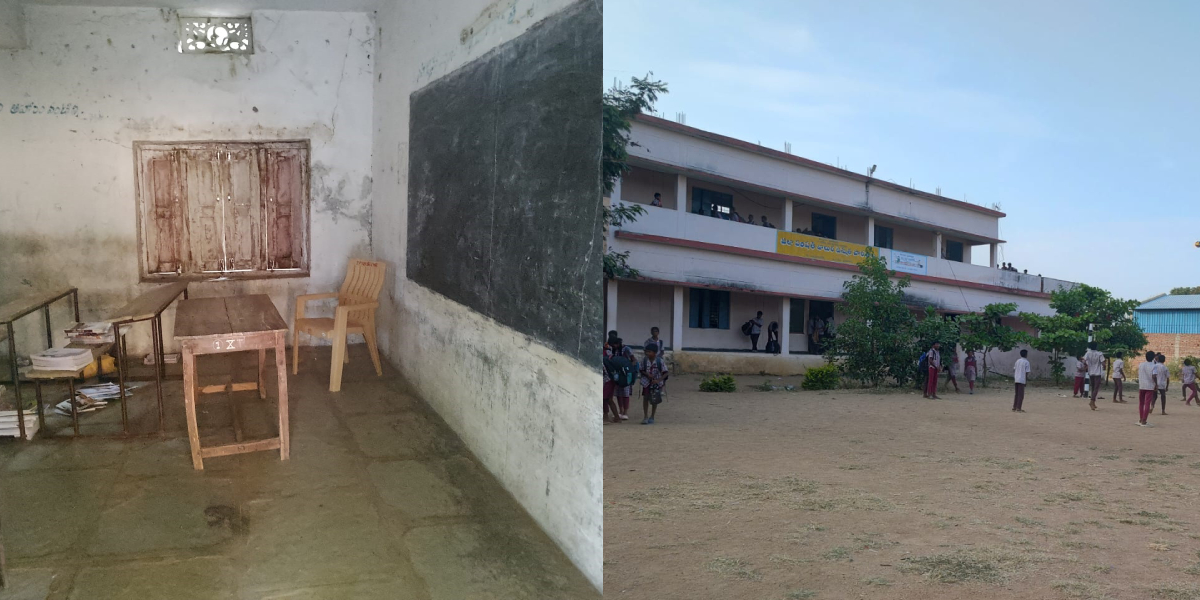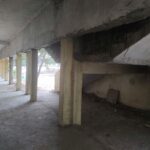Zilla Parishad High Schools in Telangana are a picture of callous neglect, with government benefits yet to reach many of them.
Published Nov 28, 2023 | 3:39 PM ⚊ Updated Nov 28, 2023 | 3:41 PM

A classroom and the playground at the ZPHS boys' school at Chinnamallareddy village in Kamareddy. (Ajay Tomar/South First)
The Zilla Parishad High School (ZPHS) in the Chinnamallareddy village of Telangana’s Kamareddy district is a 15-minute ride from Subhash Road.
With a strength of over 300 students, the school has two toilets for students — including one with an open roof — located at the far end of the playground.
The unhygienic washrooms in the school look and smell like they haven’t been cleaned for months. The doors are also broken, with no latch. One wonders how the children manage to use these deplorable facilities.
This isn’t an isolated phenomenon. Government schools in Telangana have a notorious reputation for lacking basic amenities.
As part of South First’s ground reports on the Telangana Assembly elections 2023, we bring you the reality of neglected schools in the state despite flagship programmes like Mana Ooru Mana Badi.
In December 2022, Union Education Minister Dharmendra Pradhan released data in the Rajya Sabha, according to which a total of 42,398 government schools in South India lacked basic infrastructural facilities.
Of the five major southern states, Andhra Pradesh and Telangana together accounted for more than 75 percent of schools lacking basic amenities.
As per the report sourced from the 2022 Unified District Information System for Education Plus (UDISE+) — one of the largest management information systems on school education — in Telangana, 15,107 schools out of 30,023 did not provide basic facilities to students.
Almost a year later, South First paid a visit to government schools in the run-up to the 2023 Telangana Assembly elections.
Among other things, we found that most of them lacked access to basic infrastructure and amenities for students — across Assembly constituencies.
Even teachers were horrified with the state of affairs in the ZPHS in Kamareddy’s Chinnamallareddy village.
“The flushing system generally remains out of order, and most of the urine pots have been broken for a long time now. The taps work only sometimes. It is cleaned only once in a few weeks as the sanitation worker is on a contract basis. But students have no other option,” a teacher told South First while requesting anonymity, fearing reprisal.
A few metres away was the teachers’ washroom, with litter lying at its entrance and mosquitoes becoming a nuisance.
Around 90-odd km away, the condition of the ZPHS for girls in the twin towns of Jogipet and Andole was no different, if not worse. For more than 350 students, the school had two washrooms that were in a shoddy state.
The boys’ ZPHS in Kamareddy boasted of three smart classrooms with digital boards, but others had blackboards unfit for use, like a fading wall.
Some classrooms had broken benches and uncomfortable chairs. while others did not even have a single bench.
They were a picture of neglect, with broken floors, crumbling compound walls, and the plaster peeling off the walls.
Similar was the state of the “nearly 50-year-old” girls’ ZPHS in Jogipet — a true embodiment of infrastructural woes.
The school, which imparts education in Telugu, Urdu, and English, takes pride in its three classrooms featuring digital boards.
However, out of the nine classrooms, several lacked sufficient desks or benches, compelling students to sit outside.
Just like the ZPHS in Kamareddy, this school — situated on an acre of land — bore screaming signs of neglect with damaged floors and deteriorating compound walls.
Electrification in many classrooms was also found to be insufficient.
One of the teachers told South First, “The Mana Ooru Mana Badi (Our Village-Our School) initiative is yet to reach our school. The dire need for furniture is evident and though the government has released tenders, contractors have not come forward.”
Announced in 2022, Mana Ooru Mana Badi is a Telangana government scheme that aims to strengthen basic infrastructure in schools.
Through this scheme, launched in March 2022, the state government reportedly envisioned the renovation of 9,123 government schools with an expenditure of ₹3,497.62 crore over the next three years.
In June 2023, Education Minister Sabitha Reddy inaugurated over 1,000 renovated government schools.
However, a teacher of the boys’ ZPHS in Kamareddy told South First, “In the next three years, some of the children will finish their education and will not be able to access those facilities. Why should they be devoid of the best facilities? It would be good if the state government implemented it simultaneously in all the schools.”
Meanwhile, the girls’ ZPHS in Andole faces a safety concern as the students have to travel nearly a kilometre after crossing the main road to reach the sole sports stadium in Andole and Jogipet. It also points towards the absence of a playground in the school.
Teachers were worried about potential accidents, emphasising that if one were to occur, the blame would likely fall on the staff.
Despite visits from the district education officer (DEO) and the local BRS MLA (Kranti Kiran) for inspection, the school was yet to receive the requested sports equipment through the Telangana Kreeda Pranganam initiative, aimed at enhancing sports facilities in government schools.
“If the students have to fight for their basic rights like washrooms and benches, when will they actually sit down to learn and study?” another teacher lamented to South First.
Located approximately 2 km from the girls’ ZPHS in Andole-Jogipet, the Nehru Memorial Government Degree College in the town faces similar infrastructural challenges. Despite offering undergraduate and postgraduate courses, the institution is not in a better condition.
The college’s compound is overrun by massive shrubs and bushes. The roads leading to the college remain entirely unpaved, contributing to the overall neglected appearance.
Adjacent to the girls’ hostel is a once-intended, now-neglected aquacultural pond. It is half the size of a kabaddi court and has become a breeding ground for mosquitoes.
In Maheswaram, the constituency of Education Minister Sabitha Reddy, the playground of the ZPHS is merely a turf of mud that can cause injuries to students. The state of fields in the Kamareddy and Andole-Jogipet ZPHSes is similar.

The Telangana government launched the Chief Minister’s Breakfast Scheme for schoolchildren in selected government schools on 6 October.
The scheme aims at reducing hunger in the classroom, addressing malnutrition, optimising the health and growth of students, motivating students to attend school regularly, maximising enrolment, reducing the dropout rate, and improving socialisation.
However, it has not been implemented yet in the ZPHS coed school in Ibrahimpatnam’s Sheriguda.
“The agencies responsible for providing mid-day meals are not coming forward. They don’t want to cook the menu (khichdi, poori, idli) that has been decided under the scheme. They say it is an added responsibility as they have to cook mid-day meals as well as breakfast under this scheme, all at the rate of the usual ₹10.50 per child,” a teacher at the school, who wished to remain anonymous, told South First.
The teacher added that students were also not willing to eat some of the food on the menu — especially upma — on a daily basis.
The teachers said that the school was also facing a shortage of staff. “Only 10 teachers are here in the school for a strength of over 300 students. The Physical Science subject is being taught by several teachers together.”
Siddipet is home to over 30 government and private educational institutions, with the Government Degree and PG College (Autonomous), established in 1956, being the most esteemed in the district.
Affiliated to Osmania University, the college has produced notable political figures such as K Chandrashekar Rao, the BJP’s Dubbaka MLA Raghunandan Rao, and Medak MP Kotha Prabhakar Reddy.
Gopala Sudarshanam, an assistant professor at the college, believes that the district needs a university.
“With over 5,000 students enrolled in 20 undergraduate and 10 postgraduate courses, the college faces a growing pupil strength each year, necessitating additional infrastructure,” he pointed out while speaking to South First.
He highlighted that Siddipet, sharing borders with eight other districts, had a higher student strength compared to some districts with universities.
He emphasised the need for more infrastructure to accommodate the increasing number of students.
SV Srikanth, an LLB graduate from the college, pointed out that a majority of the students came from Scheduled Caste (SC), Scheduled Tribe (ST), and Backward Class (BC) communities.
“While students from various communities often travel to Hyderabad or other districts for higher education, those from marginalised communities face additional financial challenges due to their economic constraints,” he told South First.
Anil, a former TSPSC group exams services employee-turned-farmer, pointed out the absence of a government-run-degree college in the Munugode Assembly constituency.
Speaking to South First, he threw a challenge to politicians campaigning in the segment.
“I openly ask whether any politician would take the initiative to conduct a survey and determine the number of girls dropping out of education due to the absence of a government-run degree college in Munugode,” he said.
Expressing concern, Anil emphasised that aspiring women who wished to pursue education and build a career often found themselves compelled to marry due to the lack of educational opportunities.
